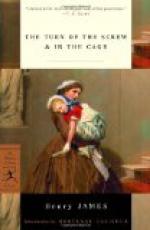She had surrendered herself moreover of late to a certain expansion of her consciousness; something that seemed perhaps vulgarly accounted for by the fact that, as the blast of the season roared louder and the waves of fashion tossed their spray further over the counter, there were more impressions to be gathered and really—for it came to that—more life to be led. Definite at any rate it was that by the time May was well started the kind of company she kept at Cocker’s had begun to strike her as a reason—a reason she might almost put forward for a policy of procrastination. It sounded silly, of course, as yet, to plead such a motive, especially as the fascination of the place was after all a sort of torment. But she liked her torment; it was a torment she should miss at Chalk Farm. She was ingenious and uncandid, therefore, about leaving the breadth of London a little longer between herself and that austerity. If she hadn’t quite the courage in short to say to Mr. Mudge that her actual chance for a play of mind was worth any week the three shillings he desired to help her to save, she yet saw something happen in the course of the month that in her heart of hearts at least answered the subtle question. This was connected precisely with the appearance of the memorable lady.
CHAPTER III
She pushed in three bescribbled forms which the girl’s hand was quick to appropriate, Mr. Buckton having so frequent a perverse instinct for catching first any eye that promised the sort of entertainment with which she had her peculiar affinity. The amusements of captives are full of a desperate contrivance, and one of our young friend’s ha’pennyworths had been the charming tale of “Picciola.” It was of course the law of the place that they were never to take no notice, as Mr. Buckton said, whom they served; but this also never prevented, certainly on the same gentleman’s own part, what he was fond of describing as the underhand game. Both her companions, for that matter, made no secret of the number of favourites they had among the ladies; sweet familiarities in spite of which she had repeatedly caught each of them in stupidities and mistakes, confusions of identity and lapses of observation that never failed to remind her how the cleverness of men ends where the cleverness of women begins. “Marguerite, Regent Street. Try on at six. All Spanish lace. Pearls. The full length.” That was the first; it had no signature. “Lady




